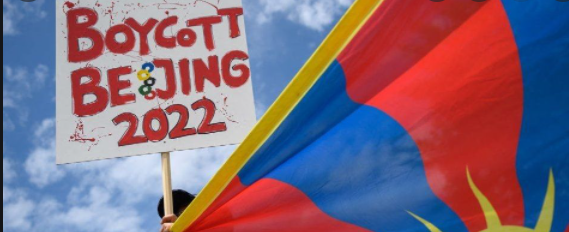Virendra Pandit
New Delhi: China reacted angrily to the USA’s Monday announcement on the diplomatic boycott of the Winter Olympics and Paralympics at Beijing, scheduled for February 2022, and the fate of the Games hanged in balance as more countries said they would reconsider participation, questioning China’s human rights record.
Citing the pandemic situation and human rights, New Zealand is also refraining from attending the Games. Australia, the UK, and Canada said they are reconsidering participation. Last week, Lithuania, already facing China’s wrath on trade over its growing relationship with Taiwan, also announced neither its President nor ministers would attend the Winter Olympics in Beijing.
Apprehending its Olympics preparations going to waste, China dismissed Washington’s boycott as a “posturing and political manipulation”. It also tried to discredit America’s decision by claiming that US diplomats had not even been invited to Beijing in the first place.
The White House said it would not send any official or diplomatic representatives to the Winter Games and Paralympics in February 2022, “given the PRC’s (People’s Republic of China’s) ongoing genocide and crimes against humanity in Xinjiang and other human rights abuses”.
“The athletes on Team USA have our full support,” White House Press Secretary Jen Psaki said, adding “We will be behind them 100 percent as we cheer them on from home. We will not be contributing to the fanfare of the Games.”
New Zealand’s Deputy Prime Minister Grant Robertson, on Tuesday, confirmed his country would not send diplomatic representatives at a ministerial level to the Games. He cited Covid-19 as the primary reason, adding “but we’ve made clear to China frequently our concerns about human rights issues.”
Outraged, former Chinese ambassador to London Liu Xiaoming claimed that the “US politicians keep hyping a ‘diplomatic boycott’ without even being invited to the Games. This wishful thinking and pure grandstanding is aimed at political manipulation.”
“It is a grave travesty of the spirit of the Olympic Charter, a blatant political provocation and a serious affront to the 1.4 billion Chinese people. It will only make the Chinese people and the world see clearly US politicians’ anti-China nature and hypocrisy.”
The Chinese embassy in Washington dismissed the Games’ boycott as “a pretentious act” and a “political manipulation”.
In Beijing, Chinese foreign ministry spokesperson Zhao Lijian accused Washington of “hyping a ‘diplomatic boycott’ without even being invited to the Games”, and threatened “resolute countermeasures” if a boycott was announced. But he did not specify those ‘countermeasures.’
According to the media reports, senior American lawmakers, including Mitt Romney (Republican) and Speaker of the House of Representatives, Nancy Pelosi (Democratic) have supported the US boycott.
If the outbreak of pandemic in 2020 and Chinese aggression of East Ladakh in India made its intentions suspicious, many countries have this year been perturbed over Beijing’s human rights records and its continued crackdown on ethnic minorities in China, suppression of democratic agitation in Hong Kong, and other human rights issues.
Recently, the ‘disappearance’ of a Chinese tennis player for three weeks and a Chinese former vice-premier’s involvement in a sexual assault against her made China’s global grandstanding even more questionable.
Several human rights groups welcomed the US boycott and urged other governments to follow suit. They include Mark Clifford, the President of the UK-based advocacy group Committee for Freedom in Hong Kong, who said the US had “shown the way” to other countries.
Earlier, the US and 64 other nations and territories had boycotted the Olympics Games in Moscow (1980) against the Soviet invasion of Afghanistan a year before.

